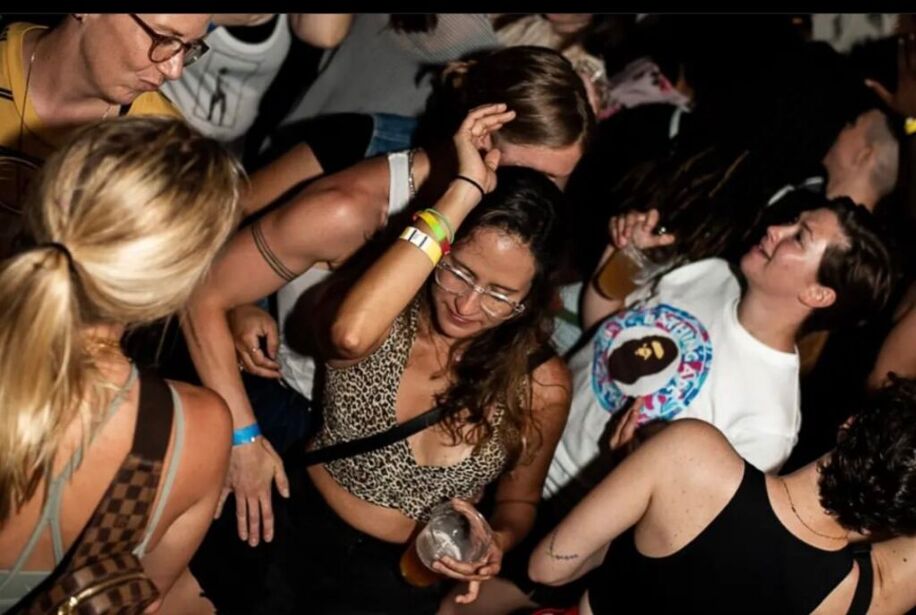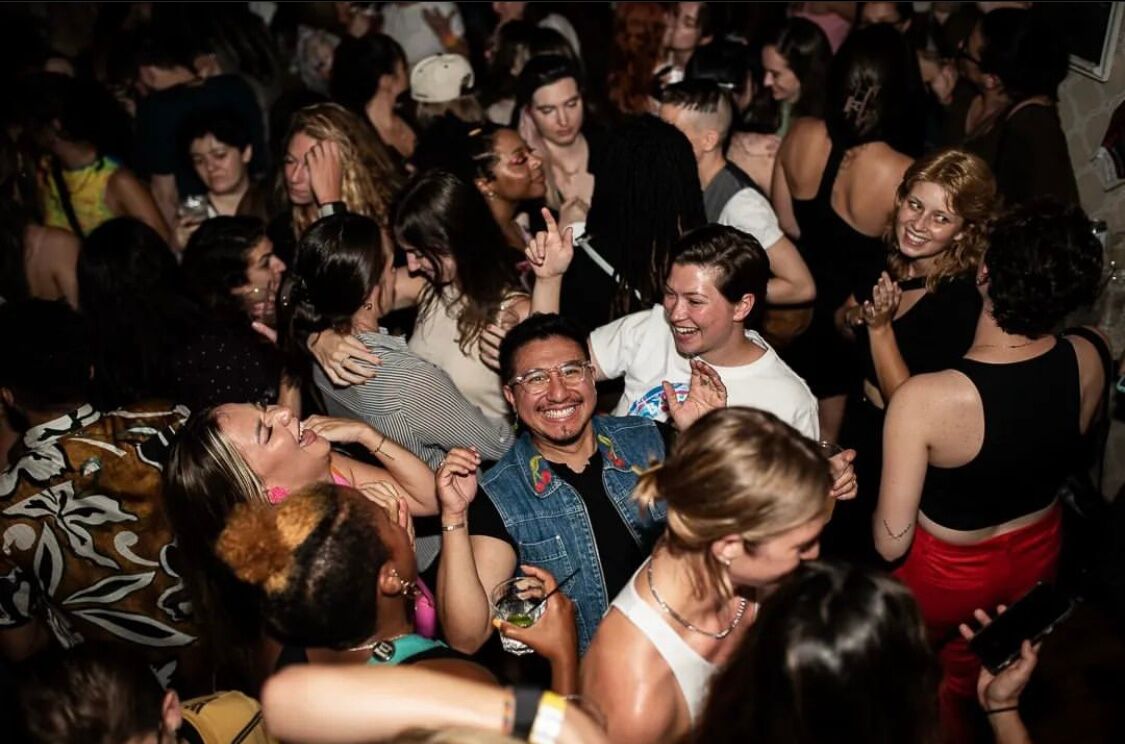The line, astoundingly, stretched around the block. “To get into a lesbian party?” my wife and I marveled as we made our way to the end of the line. Just to be sure, I darted back up to check with my ex-girlfriend, who was almost at the door. “It’s been like this since we got here!” she exclaimed. One ex-girlfriend was already inside; another one was on their way with their ex-girlfriend, also my ex-girlfriend. This is, of course, the absolute hallmark of a great lesbian party.
The line moved tidily—lesbians are very pleasant in large crowds—and we wound our way to the door quickly enough, leaving everyone plenty of time to greet everyone else’s ex-girlfriends. Meanwhile, the regular patrons at the brewery where the party had rented a venue space watched with curiosity, wondering what event could have attracted hundreds of people in tattoos and mullets, stilettos and bralettes, as well as an alarming number of Blundstones.
The answer was Second Friday Atlanta, a monthly pop-up party for women and nonbinary-identified queers, plus their friends and whoever else wants to join. “Lesbian, bi, trans—however you identify, you are welcome,” explains Katherine Prete, who started Second Friday Atlanta with Dariella Blanco. “It’s a lesbian party, but it’s open and safe for all.”
Prete and Blanco hatched the idea after meeting at a Pride party in October 2021. Prete had just relocated from Denver, where she was a regular at Second Friday, a monthly queer women’s event; she thought something similar would work in Atlanta. Meanwhile, Blanco, who’s lived in Atlanta for years, was tired of frequenting straight bars for the best DJs. And while she was meeting plenty of women, she confessed, with a laugh: “I kind of needed them to be gay!”

As soon as Prete mentioned her idea for a monthly party, Blanco was ready to run with it. “Dari texted me the next day, saying she’d booked a venue and a DJ!” Prete laughed. She barely knew anyone in town, but Blanco was confident she could convince at least 50 of her own friends and acquaintances to come. The first event in November drew 120 people. By April, they’d outgrown the first venue and had to find a bigger one. “I knew Atlanta was the spot to do this,” said Prete. “I knew people would come.”
We wound our way to the door quickly enough, leaving everyone plenty of time to greet everyone else’s ex-girlfriends.
For Prete and her friends, the Denver Second Friday party was integral to her sense of queer community. “It was something I looked forward to every single month,” Prete said. That party was started in 2007 by Silke Reuthlinger, who wanted to create safe, inclusive spaces for queer women to congregate in Denver. The monthly takeover parties, where hundreds of lesbians gathered at a traditionally straight bar, quickly became a staple of the local queer scene. Two years ago, Reuthlinger sold the business, Hip Chicks Out (now styled as HCO) to Sarah Slaton and Jen Korte, who now run the Second Friday parties, along with regular outdoor gatherings and a large annual pride party.
“When I was a young queer person in Denver, Second Fridays were where I met so many friends and built my own community,” Slaton told me. “I always had a huge passion for what Silke was doing.” She and Korte, who are both musicians, have added more live music and drag performances to HCO events, but the party’s ethos as a community-creating space remains the same. “It’s really a space for people to make friendships, make connections, for those who are single to meet people,” Slaton said. Denver has become much more welcoming to the LGTBQ+ community in the years since Second Friday began, but Slaton believes there’s still a critical need for space spaces for queer women. “There’s so much backlash against us right now—I think it’s so important to create a space for like-minded people to get together and feel they’re a part of something.”
Related:
New Docuseries The Lesbian Bar Project Showcases Three of America’s Greatest—and Last—Lesbian Bars
The new Roku docuseries is a touchingly rendered, intimate view into a beloved but endangered queer ecosystem.
Unfortunately, at a time when these spaces are so necessary, they are also rapidly disappearing. Denver, like Atlanta, has one lesbian bar; at last count, there are only 27 left in the U.S. There are lots of culprits for the lesbian bar apocalypse: rising rent, gentrifying gayborhoods, the ubiquity of online dating…the list goes on. “Because society has been built against us, we don’t have the leisure dollars to keep queer spaces open,” said Jo McDaniel, co-owner of As You Are bar in Washington, D.C., in a 2021 documentary by the Lesbian Bar Project, which raised money for struggling bars during the ongoing COVID-19 pandemic.
Pop-up parties aren’t a replacement for brick-and-mortar lesbian establishments, of which we need and deserve many (HCO often partners with Denver’s lesbian bar, Blush & Blu, for events, and many Second Friday Atlanta patrons are regulars at My Sister’s Room.) But across the country, they have become a practical solution to a growing problem: how do you build community when community spaces are disappearing?
Queer community is at the heart of queer thriving. Social connection and a sense of belonging are crucial factors in living a long and healthy life. For marginalized communities, the ability to connect with each other is how we feel less alone, make sense of our place in the world, and enjoy the deep pleasure of being ourselves. The loss of America’s lesbian bars has reduced such opportunities, leaving queer women, nonbinary people, and trans folks struggling to find each other in a world increasingly atomized by digital life. “People in this community, they want to be around each other, they want to meet each other,” said Prete.
Given queer women’s desire for physical gathering and the dwindling number of bars to support that gathering, pop-up parties provide a flexible alternative with a low barrier to entry. They’ve cropped up in cities and towns around the country, including Madison, Seattle, and Los Angeles. Supper clubs—like Alex Koones’ wildly popular Babetown in New York—are another form of queer gathering that has taken off around the country.
And unlike running a bar, hosting a pop-up party can be more of a hobby: all the lesbian party organizers I spoke with have full-time jobs. At Second Friday Atlanta, ticket sales mostly go towards covering event costs—Prete and Blanco pay themselves a small amount for prep work, and the rest goes to a local LGBTQ+ charity. Neither has a background in event planning, but they had a general sense of what a good party requires, and neither was scared to pull out a phone and start making calls.
The work has paid off: the last few events have drawn 500 people, filling the latest venue to capacity. But for Prete and Blanco, turning a tipsy pride idea into a thriving queer community has been all the reward they need. “Seeing everyone on the dance floor, dancing and being themselves—that makes me so happy that we’ve created this,” Blanco said.
As the event has grown, it’s become a connection hub for other queer women’s events: local queer sports leagues table at the party, and a lesbian-owned coffee shop sells merch. And for some out-of-town attendees, seeing the something-from-nothing approach that created Second Fridays inspired them to do the same at home.
“We were like, oh my God, this is amazing—why can’t Athens have something like this?” Marlise Sifre told me. She and her wife had recently moved to Athens, Georgia after years in the UK, and were struggling to find queer community in the small college town. “There’s not even really a gay bar at all in Athens,” said Sifre. “For queer people in general, but specifically queer women—there’s nothing for us.”
After attending the Atlanta event last fall, she and her wife decided to try something similar. They made an Instagram account for the event and asked friends to recommend venues, photographers, and DJs. They held their first event this February—it sold out with a waitlist. “It’s really clear that queer women want to congregate and have that space,” Sifre told me.
“It’s like they say—if you build it, they will come.”♦
Don't forget to share:
Help make sure LGBTQ+ stories are being told...
We can't rely on mainstream media to tell our stories. That's why we don't lock our articles behind a paywall. Will you support our mission with a contribution today?
Cancel anytime · Proudly LGBTQ+ owned and operated
Read More in Culture
The Latest on INTO
Subscribe to get a twice-weekly dose of queer news, updates, and insights from the INTO team.
in Your Inbox














